Titled “H2 BEYOND THE HYPE” the July issue discusses the project motivation and vision. Featuring a great interview with Principal Investigator Professor Tim Mays, the article sets out the strategic context of Hydrogen, the key engineering challenges and why UK-HyRES can help in accomplishing our Net Zero ambitions. Not least through interdisciplinary, cross-cutting engagement. Read the full article online or download it here.
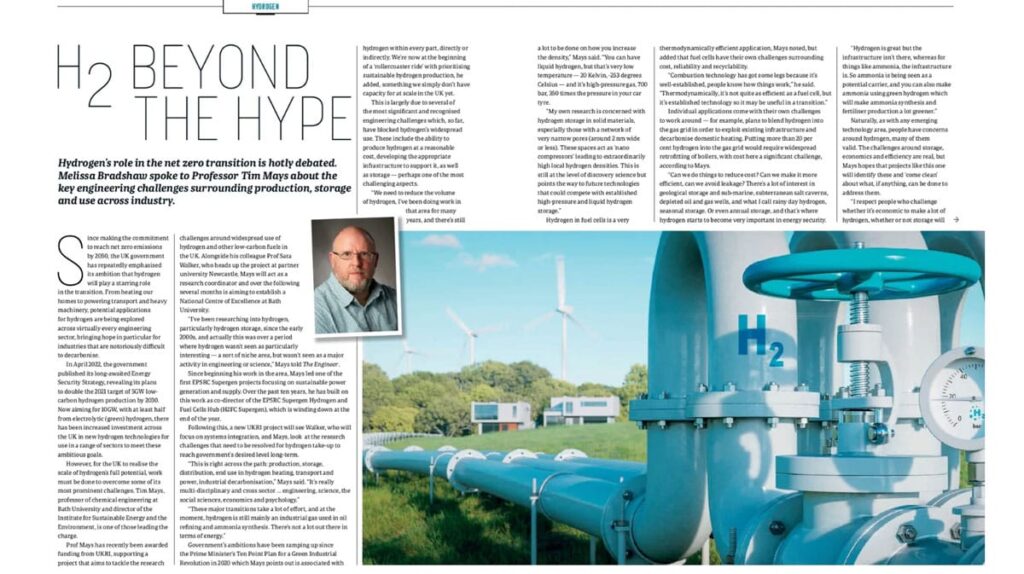
HYDROGEN CHAMPION APPOINTED AS GOVERNMENT ACCELERATES UK HYDROGEN INVESTMENT
20th July 2022

The Business and Energy Secretary has today (20 July 2022) met with industry to accelerate private investment in hydrogen as a clean energy source and a super-fuel of the future.
At the Hydrogen Investment Summit a new round of funding was announced to give investors the confidence they need, reaffirming the government’s vision for the UK to be a hydrogen-based economy – as set out in the Hydrogen Strategy published in August 2021. This is a major next step in delivering the government’s ambition to have 1 GW of electrolytic hydrogen in operation or construction by the end of 2025 – which could produce enough hydrogen to fuel up to 45,000 buses per year.
Kwasi Kwarteng demonstrated how the government is making good progress on unlocking the £9 billion investment needed to make hydrogen a cornerstone of the UK’s greener future, while supporting a move away from costly fossil fuels. In recent months, the government has opened applications for the £240 million Net Zero Hydrogen Fund, published the Hydrogen Investor Roadmap, and set out details for the Hydrogen Business Model and Low Carbon Hydrogen Standard.
Energy Minister Greg Hands announced the opening of the joint allocation round for electrolytic (‘green’) hydrogen projects, a method which uses an electrical current to separate hydrogen from oxygen in water. Under this joint round, funding is available from both the Net Zero Hydrogen Fund (NZHF), and the Hydrogen Business Model (HBM).
Kwasi Kwarteng also announced the appointment of Jane Toogood as the UK’s first Hydrogen Champion, which will see her play a vital role in bringing industry and government together to realise the government’s hydrogen ambitions – including supporting up to 10 GW of hydrogen production capacity by 2030, aiming to run annual allocation rounds for electrolytic hydrogen, and designing, by 2025, new business models for hydrogen transport and storage infrastructure. These targets will put us on track to make the UK a world-leading hydrogen economy, attracting billions of pounds in inward investment and supporting 12,000 jobs across the country.
Business and Energy Secretary Kwasi Kwarteng said:
“The UK’s hydrogen sector is open for business. With the right investment, we can unlock the enormous potential of hydrogen by reindustrialising our economy and ending our dependency on expensive fossil fuels.
The new funding represents an important step forward in realising this potential, and I look forward to working with Jane Toogood as our new Hydrogen Champion, ensuring industry and government are aligned to accelerate hydrogen production as a clean, home grown energy source – boosting our energy security and creating jobs.”
Business and Energy Secretary, Kwasi Kwarteng
New Hydrogen Champion Jane Toogood will help drive industry investment and deployment at this critical stage in the early development of the UK hydrogen economy. She will identify current barriers to building a strong UK hydrogen economy and develop creative solutions for how these can be addressed to accelerate the project pipeline and deliver on the UK government commitments.
Hydrogen Champion Jane Toogood said:
“The government has ambitious plans for the UK to ramp up hydrogen technology. Hydrogen deployment as a clean energy source is one of the key solutions to help the UK reach its net zero targets and I strongly believe there is an opportunity to accelerate this, working collaboratively across industry and government to land projects and infrastructure on a timeline that serves stakeholder and customers’ needs.
At Johnson Matthey, we see that demand for hydrogen ecosystems globally is being taken up across industry, transportation and the power sector at a rapid pace, especially with the increased focus on energy security. As the UK’s Hydrogen Champion, working with industry and government, I hope to ensure we make progress in building a thriving hydrogen economy ensuring private sector investment and policy decisions are aligned to support timely decisions and outcomes.”
Hydrogen Champion, Jane Toogood
Clare Jackson, Chief Executive of Hydrogen UK said:
“Jane Toogood’s appointment as the UK’s first Hydrogen Champion – and opening of the joint allocation round for green hydrogen projects – is a welcome statement of intent from the government. Hydrogen UK looks forward to working closely with policy officials to review progress against the landmark Hydrogen Strategy of 2021, and to setting ambitious goals for the future as we work together to build a British hydrogen economy, which is crucial if we are to reach our much-needed net zero goals.”
Chief Executive of Hydrogen UK, Clare Jackson
The announcements are also supported by the publication of several documents that deliver on commitments set out in the UK Hydrogen Strategy and the British Energy Security Strategy. These include:
- a Sector Development Action Plan which sets out actions government and industry can take to seize the opportunities presented by the low carbon hydrogen economy, in areas like investment, supply chains, skills and exports
- an update to the market on progress on delivering on the Hydrogen Strategy
- a Research and Innovation (R&I) brochure giving industry guidance how support and funding for hydrogen R&I projects can be accessed from major public sector organisations
- the application form and guidance for the Net Zero Hydrogen Fund (NZHF) and Hydrogen Business Model (HBM) joint allocation round, which builds on feedback from a recent market engagement exercise to set out the key criteria for the round
Together, these documents further strengthen the policy and regulatory landscape for the UK’s hydrogen sector and help keep up the momentum that has characterised the last 12 months for the hydrogen economy, providing further certainty for investors and industry alike.
About Jane Toogood
Jane is Chief Executive of Catalyst Technologies at Johnson Matthey, a FTSE 250 company which is a major player in the research and development of technologies to accelerate the transition towards net zero.
Jane is co-Chair (with the BEIS Secretary of State) of the Hydrogen Advisory Council, created for government and industry to work together to identify and promote the actions required to enable the supply of low carbon hydrogen at scale for use across the UK’s energy system.
She has a wealth of experience in business transformation and growth, built over many years across global companies, covering multiple industry sectors from automotive, to healthcare, to petrochemicals.
Workshop 4 – Alternative Liquid Fuels
20th July 2022
Alternative liquid fuels (ALFs) such as ammonia are increasingly regarded as a key component of the future energy mix towards the net-zero imperative. Through our launch workshop, you also told us that alternative liquid fuels were one of the major areas that you wanted to discuss. On the 20th July UK-HyRES held the fourth themed workshop focused on the research challenges, future vision and opportunities surrounding ammonia and alternative liquid fuels to answer that call.
Discussion focused not only around ammonia but also on some other alternatives such as ethanol, methanol and formic acid. In the workshop, we first watched an insightful talk by Josh Makepeace (University of Birmingham), who set out the background of ammonia and why it is so promising, including how the related fuel cell technologies might look. We also heard from Laura Torrente-Murciano (University of Cambridge), who explored the reasons why ALFs are needed, remarking, “We need novel integrated energy systems taking into consideration energy supply and demand profiles”.
With safety a common discussion throughout all of our workshops, we later heard from Stuart Hawksworth (Head, Centre for Energy and Major Hazards, Health & Safety Executive & President, International Association for Hydrogen Safety). He reminded us that “safety can not be an afterthought” and that we need to think smarter about safety and develop new evidence-based standards. John Irvine (University of St Andrews) gave the final insight talk, with his perspective on the future vision for alternative liquid fuels and green ammonia, highlighting the particular industrial interest in ammonia for shipping.
The Collective expertly facilitated the session to allow attendees to debate key questions designed to determine the research challenges and the opportunities, framed around the Theory of Change.
The UK-HyRES team would like to particularly thank our invited speakers for their insightful contributions as well as all attendees. Developing a UK Centre of Excellence would not be possible without this fantastic engagement.
The research team will now start work analysing the comments and outputs, with the final outcomes published on our website in the coming weeks.
Thanks again for all your participation, don’t forget our next workshops can be found on our Events page.
A recording of the workshop is available below. You can also download the workshop slide deck and view all the insight talks.
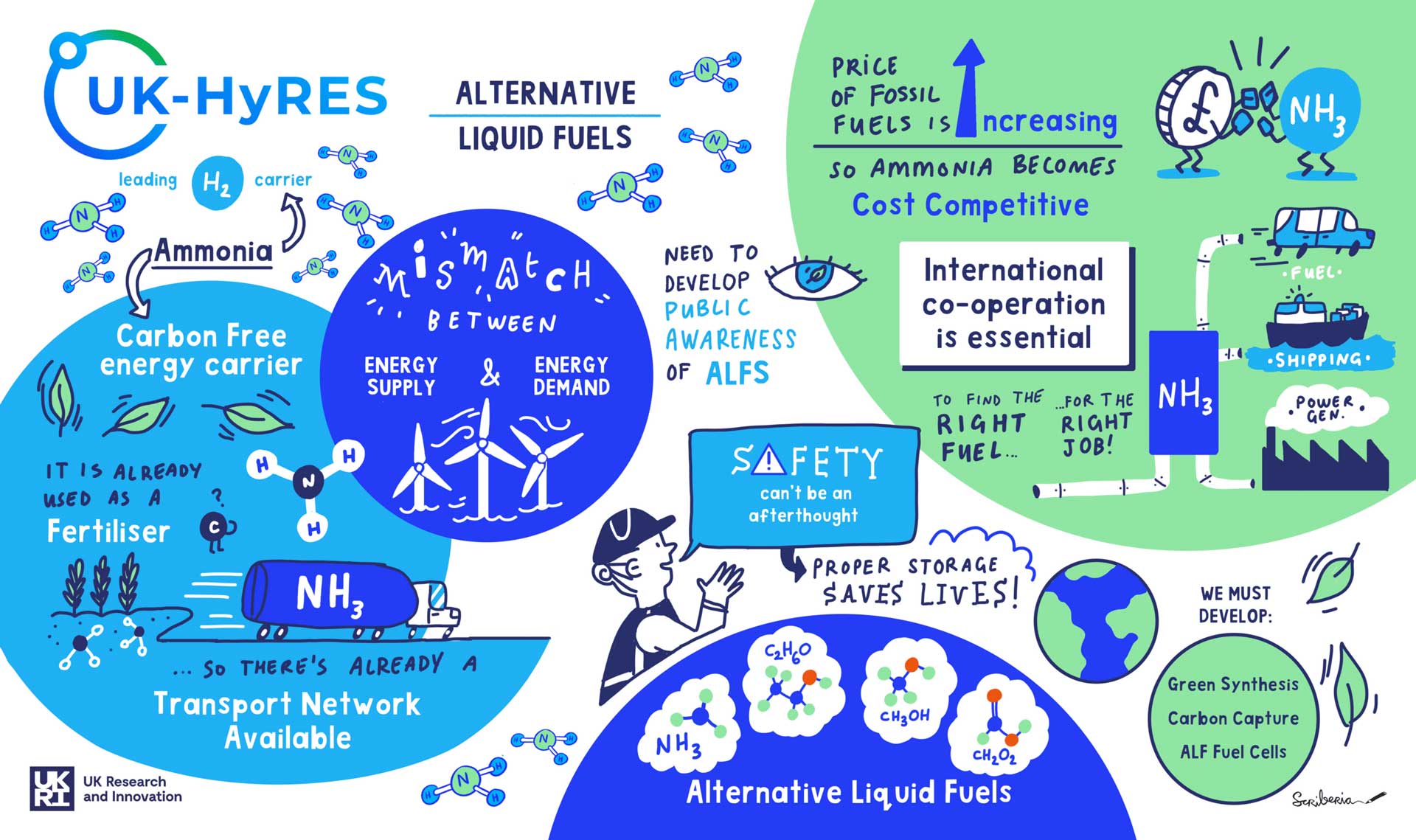
Read more about the Production workshop >>
Read more about the Storage workshop >>
WORKSHOP 3 – END USE
5th July 2022
Hydrogen is often discussed from the perspective of fuel cells, but many other end users rely on hydrogen, from ammonia, methanol and steel production, to power generation, oil and metal refining, and synthetic fuels. On the 5th July 2022, UK-HyRES held the third themed workshop, focused on the challenges, opportunities and future vision for the end use of hydrogen.
The end use of hydrogen is crucial to accelerating the uptake of hydrogen and alternative liquid fuels in pursuit of net zero. In the worksho,p we watched an enlightening video, recommended by Nigel Holmes (Scottish Hydrogen and Fuel Cell Association) and produced by Ben Burman, summarising the motivation and challenges in hydrogen uptake.
Later in the workshop, Anthony Kurcernak (Imperial College London) delivered an insight talk on the strategic drivers for change, highlighting the many end users with a stake in the hydrogen economy. Qiong Cai (University of Surrey) gave the final insight talk, with her perspective on the future vision for hydrogen fuel cell technology, such as cheaper and more durable catalysts.
Facilitated by The Collective, attendees debated key questions designed to determine the research challenges and the opportunities, framed around the Theory of Change.
The UK-HyRES team would like to particularly thank our invited speakers for their insightful contributions as well as all attendees. Developing a UK Centre of Excellence would not be possible without this fantastic engagement.
The research team will now start work analysing the comments and outputs, with the final outcomes published on our website in the coming weeks.
Thanks again for all your participation, don’t forget our next workshops can be found on our Events page
A recording of the workshop and all insight talks are available below. Catch up now if you missed the event.
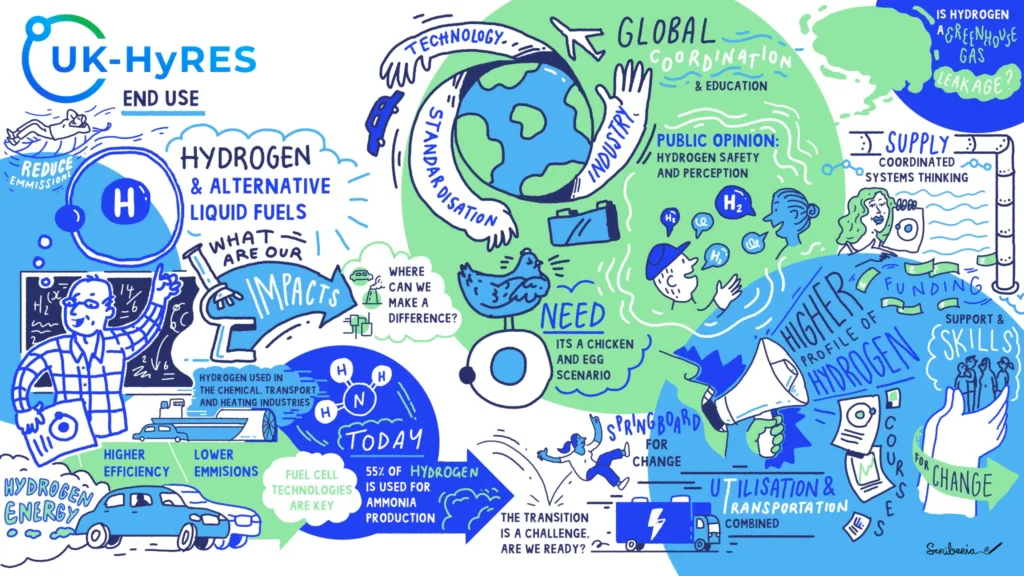
Workshop 2 – Storage and distribution
16th June 2022
Workshop 2 took place on the 16th June 2022, 13:30-16:30. There was engagement from the full spectrum of stakeholders across the hydrogen economy.
Building on the success of the Launch event, workshop 2 centred around the research challenges of the Storage and Distribution of Hydrogen.
Engaging insight talks were delivered during the session.
David Book (University of Birmingham) and Chris Manson-Whitton (Progressive Energy) set the landscape with their strategic drivers for change talk. We also heard from Gavin Walker (University of Nottingham) and Shubi Mukherjee (Ceres Power), who also delivered their future vision for storage. All four storage insight talks are available to watch below, as well as the full workshop recording.
Facilitated by The Collective, attendees debated key questions designed to determine the research challenges and the opportunities, framed around the Theory of Change.
The UK-HyRES team would like to particularly thank our invited speakers for their insightful contributions as well as all attendees. Developing a UK Centre of Excellence would not be possible without this fantastic engagement.
The research team will now start work analysing the comments and outputs, with the final outcomes published on our website in the coming weeks.
Thanks again for all your participation, don’t forget our next workshops can be found on our Events page
If you want to catch up with what happened, you can view and download recordings for each workshop here.
Storage & Distribution of Hydrogen Workshop
Insight talks delivered during the Storage & Distribution workshop by David Book (University of Birmingham), Chris Manson-Whitton (Progressive Energy), Gavin Walker (University of Nottingham), and Shubi Mukherjee (Ceres Power).
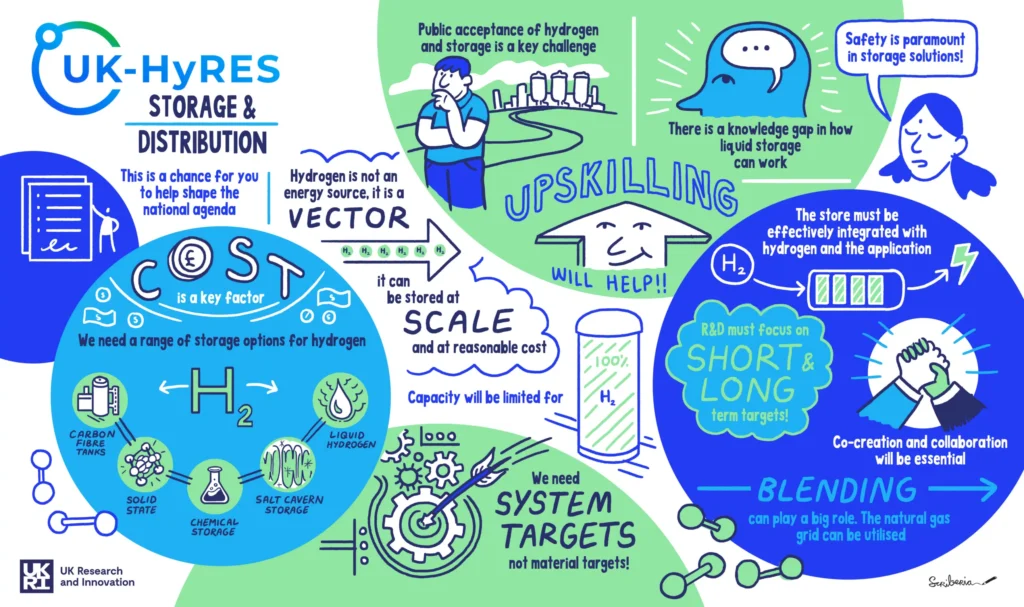
Read more about the Production workshop >>
Prof. Tim Mays delivered a UK-HyRES presentation at the University of Bath’s summer showcase for the Centre for Sustainable and Circular Technologies (CSCT), which he also co-directs.
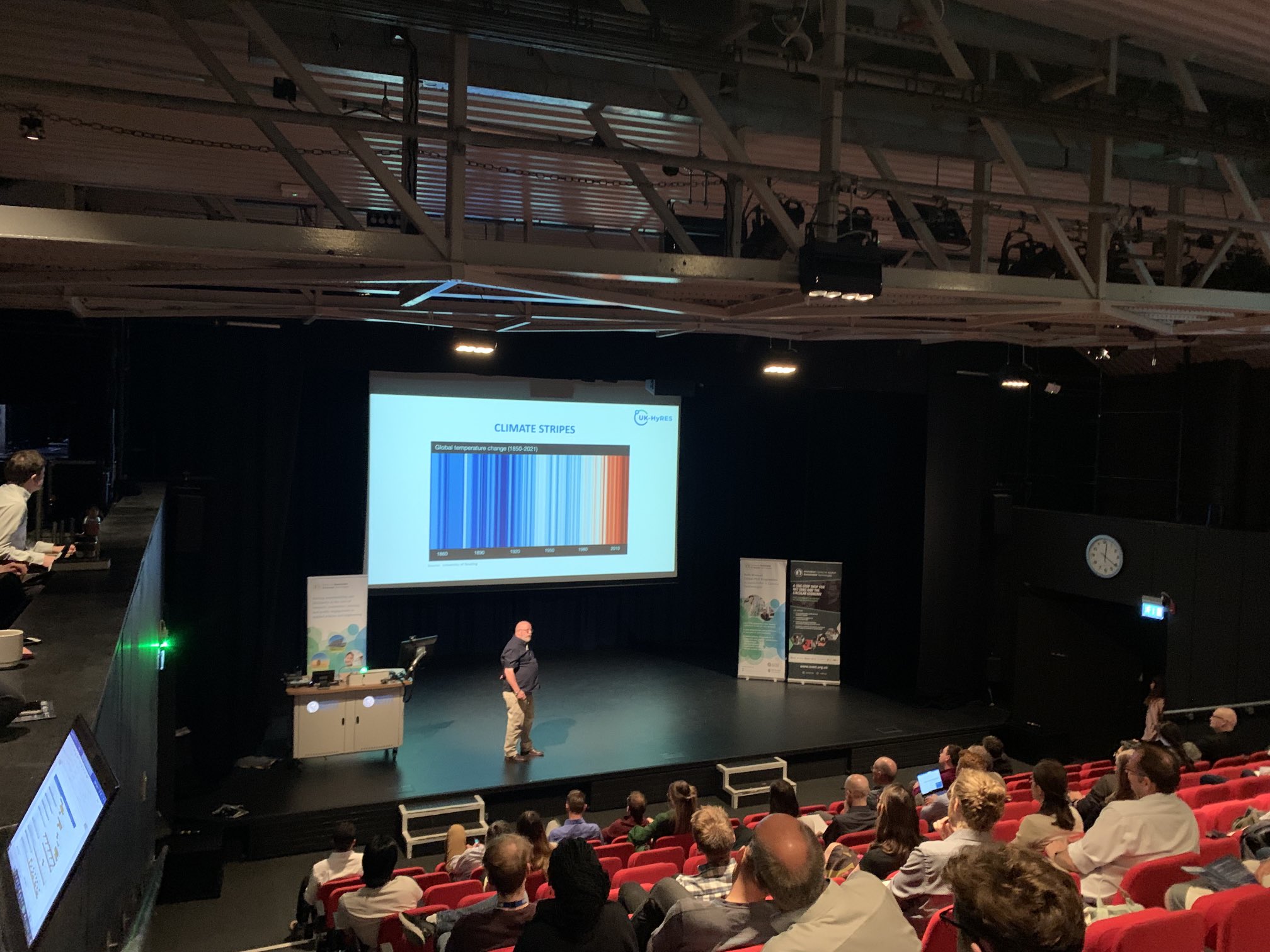
Titled “Molecules to Materials for a Sustainable Future”, the CSCT’s annual summer showcase was held on the 27th-28th June 2022.
The event, a multi-disciplinary conference, featured a wide range of research topics and excellent presentations and talks. Alongside the CSCT’s CDT student presentations, ignite talks and posters, a wide range of industrial and academic presentations from leading figures were heard. These included a presentation from Prof. Tim Mays about the UK-HyRES project ambitions. Alongside Prof. Mays, speakers at the event included:
Prof Igor Polikarpov, Coordinator of the Center for Renewable Energy and Molecular Biotechnology (University of Sao Paulo)
Prof Stephen Eichhorn, Professor of Materials Science & Engineering (University of Bristol)
Prof Phil Andrews, Head of School of Chemistry (Monash University)
Prof Toby Jenkins, Professor of Biophysical Chemistry (University of Bath)
Dr Camilla Alexander-White, Chemicals Safety Assessor & Independent Scientific Advisor on Chemicals Policy (Royal Society of Chemistry)
Dr Marcus Johns, Postdoctoral Researcher (University of British Columbia)
Dr Davide Califano, Protein Chemist (Naturbeads)
Dr Paul Murray, Director (Paul Murray Catalysis Consulting) & Chief Technical Officer (PhosphonicS)
Prof Susan Bourne, Professor of Physical Chemistry (University of Cape Town)
Juliet Davenport OBE, Founder (Good Energy)
Dr Gerrit Gobius du Sart, Corporate Scientist (TotalEnergies Corbion)
Sarah Davidson, Group Sustainability Coordinator for Global R&T (CRODA)
Prof Peter Dowding, Chief Research Scientist (Infineum)
Prof. Rachael Rothman discusses the UK-HyRES project goals as part of the EPSRC Engineering Net Zero week
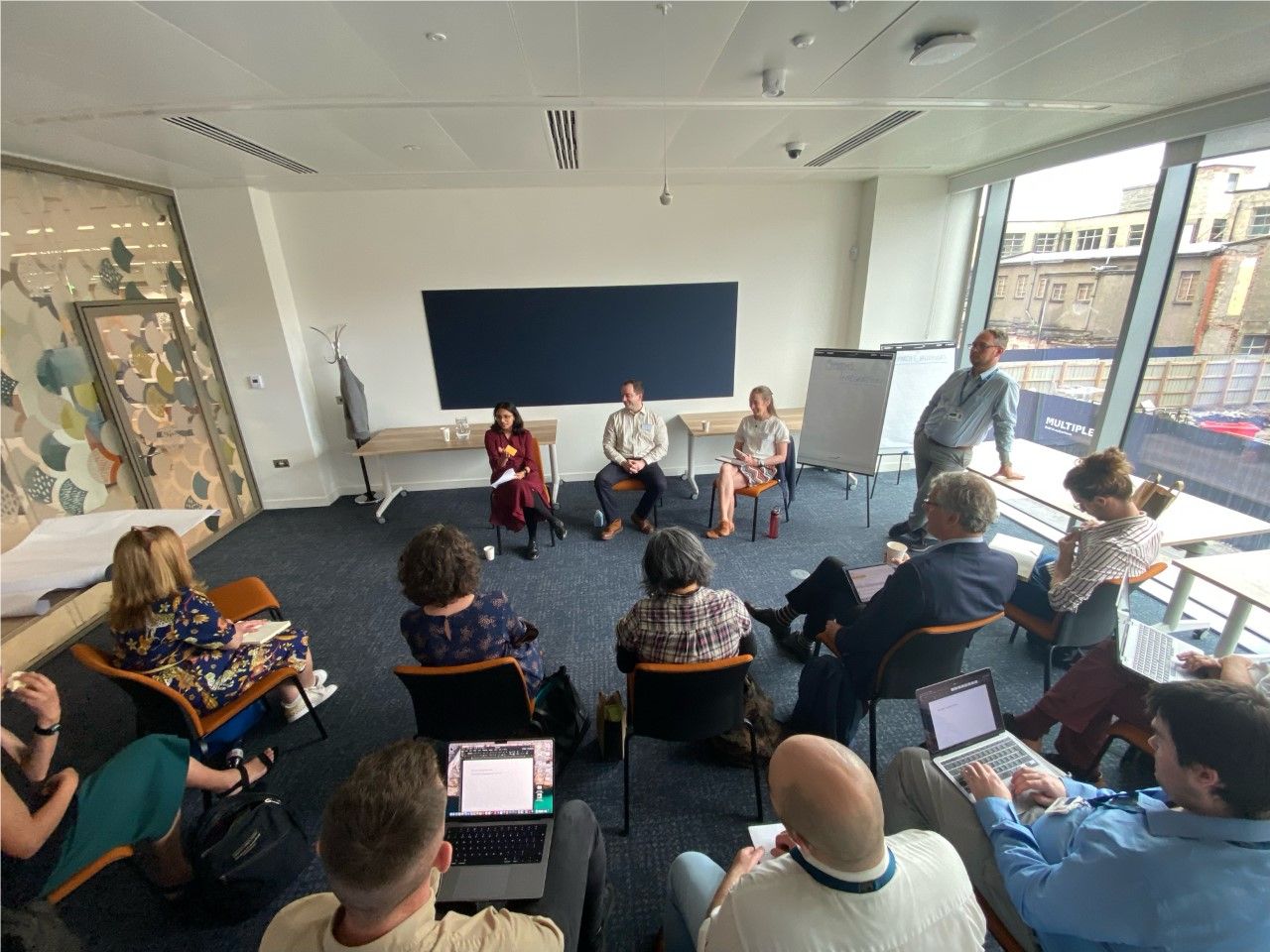
The Engineering and Physical Sciences Research Council (EPSRC) conducted a flagship Engineering Net Zero week of events. Partly online, with a series of webinars, and also in-person in the Advanced Research Centre at the University of Glasgow. The event showcased the breadth of engineering and physical sciences research across the EPSRC portfolio that are driving impact towards the UK’s net zero goals.
Prof. Rachael Rothman delivered an engaging presentation on the UK-HyRES project, including our aims, objective and vision. Discussion of hydrogen and how it can play a part in the net zero transition also featured, with Prof. Rothman continuing the conversation on the panel. There was lots of great discussions about systems level thinking, delivery and the need for life cycle assessment.
Prof. Tim Mays discusses hydrogen on behalf of the EPSRC Supergen Hydrogen and Fuel Cell Research Hub, which he also co-directs, as part of the EPSRC Engineering Net Zero week
Answering the question, “What are the social impacts of the move to net zero? – The view from the EPSRC Supergen Programme”, Prof. Tim Mays gave a presentation about the H2FC project and stressed the importance of “Society and Sustainable Development, where society at large must be engaged to appreciate the reasons for, and methods and impacts of, net zero research.” Prof. Mays also continued the conversation during the panel session which was chaired by Helen Stockton from National Energy Action.
Other contributors to the event included:
Presentations and panel
Mirjam Roeder, Supergen Bioenergy Hub and Aston University
Furong Li, Supergen Energy Networks Hub and University of Bath
Philip Sandwell, Supergen SuperSolar and Imperial
Tim Mays, H2FC Supergen (Hydrogen and Fuel Cell Research Hub) and University of Bath
Deborah Greaves, Supergen Offshore Renewable Energy Hub and University of Plymouth
Xinfang Wang, Supergen Energy Storage Network and University of Birmingham
Jenny Cooper, Supergen High Level Group, EPSRC
Watch the webinar recording
Workshop 1 – Production
16th June 2022
Workshop 1 took place on the 16th June 2022, 09:30-12:30. There was engagement from the full spectrum of stakeholders across the hydrogen economy.
Building on the success of the Launch event, workshop 1 focused on the challenges related to the Production of Hydrogen.
Engaging insight talks were delivered during the workshop from leading voices.
Anton Orpin-Massey (Senior Policy Advisor, Hydrogen Production Strategy, BEIS) and Richard Sulley (Net Zero project director at the South Yorkshire Mayoral Combined Authority) spoke about the strategic drivers for change. Marcus Newborough (Development Director at ITM Power) and Patricia Thornley (Director Supergen Bioenergy Hub) later discussed their future vision.
If you missed the event, or want to catch up, the workshop recordings are available to watch below.
Facilitated by The Collective, attendees debated key questions designed to determine the research challenges and the opportunities, with questions framed around the Theory of Change.
The UK-HyRES team would like to particularly thank our invited speakers for their insightful contributions, as well as all attendees. Developing a UK Centre of Excellence would not be possible without this fantastic engagement.
The research team will now start work analysing the comments and outputs, with the final outcomes published on our website in the coming weeks.
Thanks again for all your participation, don’t forget our next workshops can be found on our Events page.
If you want to catch-up with what happened, you can view and download recordings for each workshop here.
Production of Hydrogen Workshop
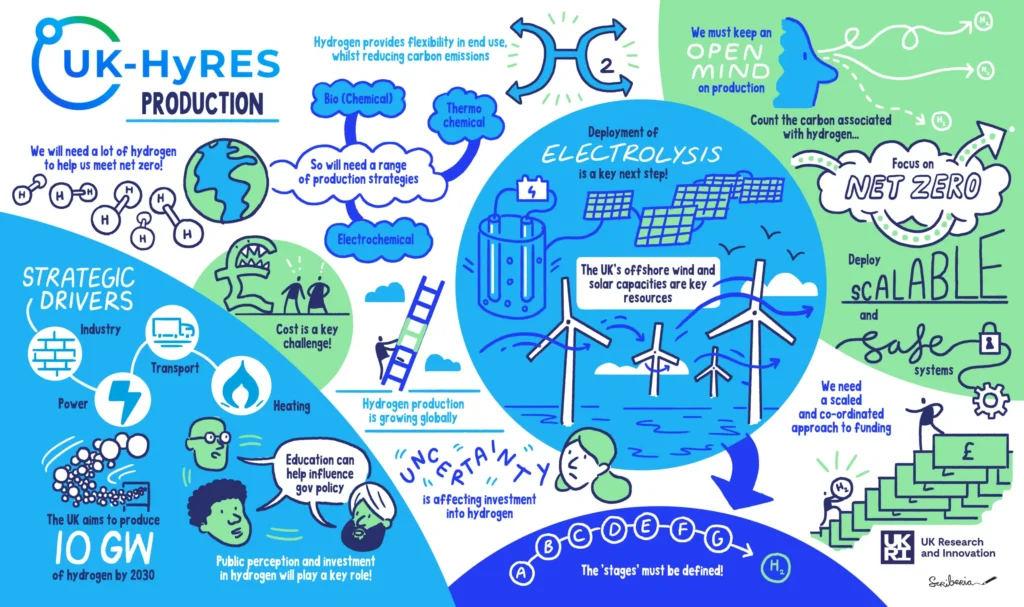
Read more about the Storage workshop >>
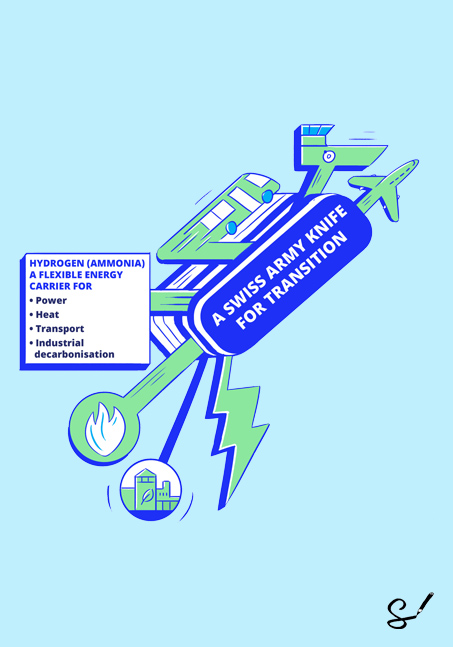
Prof Tim Mays gave the opening Plenary Lecture at the EPSRC Supergen Hydrogen and Fuel Cell Research Hub

Prof Tim Mays gave the opening Plenary Lecture at the EPSRC Supergen Hydrogen and Fuel Cell Research Hub conference at the University of St Andrews on 8 June 2022. His lecture introduced the scope and details of the UK-HyRES project. Download the slide deck to read more about the project.